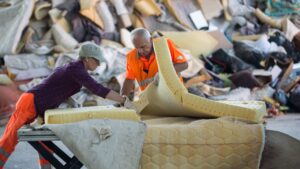Revolutionizing Mattress Disposal: The Growing Eco-Friendly Movement
In recent years, consumers in several states have taken a significant step towards making the mattress industry more eco-friendly. This initiative not only helps reduce environmental impact but also opens opportunities for innovation in how we handle waste. At Extreme Investor Network, we believe that understanding these developments can empower our readers to make informed financial decisions, particularly as sustainability becomes increasingly mainstream.
Unpacking the Eco-Friendly Fees
Currently, four progressive states—California, Connecticut, Oregon, and Rhode Island—have implemented a recycling fee on all mattress purchases, whether online or in-store. This flat fee ranges from $16 to approximately $23, contributing to state recycling programs designed to divert waste from landfills. The Mattress Recycling Council (MRC) reports that Americans discard between 15 to 20 million mattresses each year, roughly 50,000 per day. Shockingly, over 75% of a mattress is recyclable, including materials like wood, steel, and various foams.
By imposing these fees, states are not just collecting revenue; they are actively encouraging a circular economy. This proactive approach aligns with global sustainability goals, appealing to environmentally-conscious consumers.
The Financial Impact: What Consumers Need to Know
While the concept of paying a recycling fee might initially be met with resistance, it’s essential to view this through a wider financial lens. These fees are seen as an investment in the environment. California and Connecticut have recently raised their fees to $16, while Rhode Island increased its to $20.50, reflecting growing support for these initiatives among lawmakers and consumers alike.
As the Eco-Friendly movement gains momentum, states like Massachusetts, Maryland, New York, and Virginia are also exploring the establishment of similar programs. At Extreme Investor Network, we see these developments as an opportunity for socially responsible investing. Investing in companies that prioritize sustainability could yield long-term returns as eco-conscious consumerism rises.
Expanding Recycling Options for Consumers
Currently, recycling options for mattresses are limited, with only 58 companies nationwide offering recycling services according to the MRC. States without recycling laws typically charge fees for drop-offs and home pickups, a service we discovered costs around $95 in urban areas like New York City. However, programs like those in Oregon are setting a precedent with their commitment to creating convenient drop-off locations across every county. This strategy not only facilitates recycling but also reduces illegal dumping, a critical hurdle many states face.
Understanding Extended Producer Responsibility (EPR)
The initiative behind mattress recycling represents the growing trend of Extended Producer Responsibility (EPR), where manufacturers are held accountable for their products’ end-of-life management. Reid Lifset, an expert in industrial ecology, highlights that EPR laws create sustainable funding for recycling systems. As fees are collected, they are funneled into programs that tackle operational costs, public education, and overall program administration, thereby fostering a sustainable recycling ecosystem.
Why This Matters for Investors
As DIY recycling solutions and environmentally-conscious products become more available, savvy investors should monitor this evolving market closely. Companies that align with sustainability goals or that are proactive in supporting EPR programs could present lucrative investment opportunities.
In conclusion, the mattress recycling movement showcases the intersection of consumer behavior, environmental responsibility, and financial opportunity. At Extreme Investor Network, we are committed to providing you with insights and guidance on how to navigate these changes in the marketplace effectively. The push for a greener planet not only helps protect our environment but could also offer financial incentives for early adopters of sustainable practices.
Stay tuned for more insights into how responsible investing can help shape a sustainable future!

